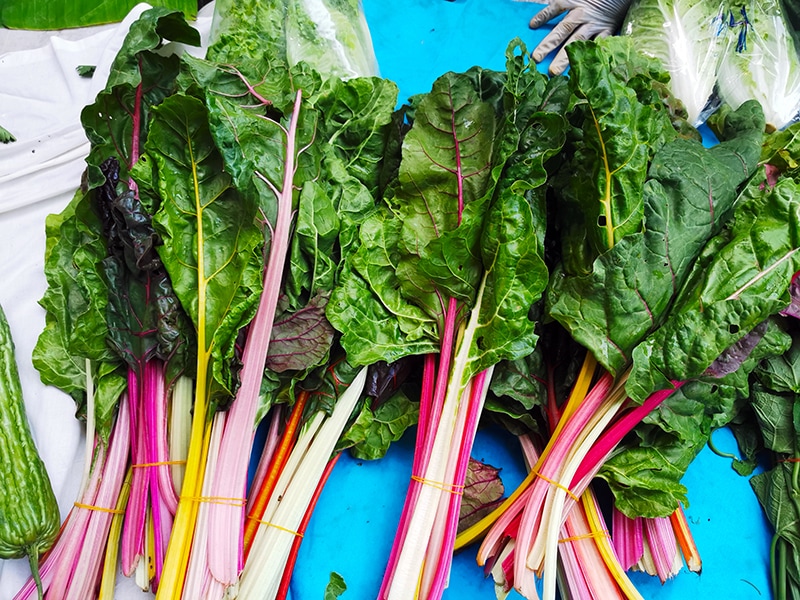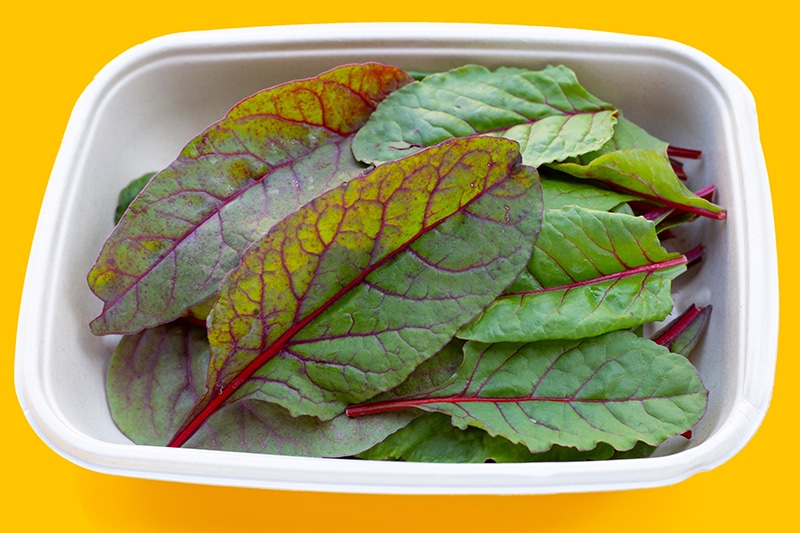Swiss chard seems safe to share with your dog, but the colorful stalks might concern you. Well, your first instinct was right. Swiss chard is safe to share with your dog.
Swiss chard is part of the same family as spinach, quinoa, and beets, and it is not only suitable, but it is a healthy treat for your pup. However, there are some things to consider before you feed your favorite canine the leafy vegetable, like how much you can give them and how you should serve it. So, keep reading to learn how to introduce this vegetable to your dog’s diet.

Is Swiss Chard Healthy for Your Dog?
Swiss chard is low in fat and can benefit your dog if served in moderation. Too much of anything can have negative results, and Swiss chard can result in digestive upset and so much gas it will have you running to a different room. But let’s take a closer look at all the benefits of Swiss chard.1
| Vitamin A: | Supports the maintenance of organs like the lungs, heart, and kidneys, immune function, and vision |
| Vitamin C: | Supports brain health and reduces inflammation |
| Vitamin K: | Assists with your dog’s ability to clot blood when injured |
| Antioxidant beta-carotene: | Reduces the risk of certain cancers and heart disease by converting to vitamin A |
| Fiber: | Promotes healthy digestion and helps make dogs feel fuller for longer |
Your dog should, of course, be getting all of these benefits from their regular diet. However, there is no harm in adding healthy treats like Swiss chard as long as you aren’t feeding them too much or using it to replace a healthy, balanced diet.
Swiss chard may benefit overweight dogs that are accustomed to eating treats loaded with calories and fat. Obese dogs are at an increased risk for heart disease,2 cancer, diabetes, and osteoarthritis, amongst other health problems. Swiss chard can be used instead of commercial treats and is an excellent alternative for training if your dog likes the taste.

The Risks of Eating Swiss Chard
Too much Swiss chard can result in flatulence and digestive issues. You must also be cautious about serving this leafy snack to your dog, as it contains oxalates,3 which can result in bladder and kidney stones. Cooking Swiss chard before you serve it will reduce the calcium oxalate content.
Thankfully, your dog probably won’t be too fond of this snack if it’s raw, as it can be quite bitter. So, steaming or boiling will make it more appealing and safer. You can also serve it finely chopped or blended and mix it with dry food if they turn their nose up at it when it’s by itself.

Should You Ask Your Veterinarian First?
Your veterinarian is the ultimate authority when establishing a diet for your pet. Whenever you change your dog’s diet, regardless of how minor it is, check with your vet first. Dogs suffering from health problems, particularly anemia, digestive problems, food allergies, or kidney problems, should never try new treats or meals unless your vet clears them.
PangoVet. It’s an online service where you can <b>talk to a vet online</b> and get the personalized advice you need for your pet — all at an affordable price!
</p>
<div class="su-button-center"><a href=https://www.dogster.com/dog-nutrition/"https://pangovet.com/?utm_source=dogster&utm_medium=article&utm_campaign=dog_eat_drink%22 class="su-button su-button-style-default" style="color:#FFFFFF;background-color:#FF6600;border-color:#cc5200;border-radius:9px;-moz-border-radius:9px;-webkit-border-radius:9px" target="_blank" rel="nofollow"><span style="color:#FFFFFF;padding:0px 24px;font-size:18px;line-height:36px;border-color:#ff944d;border-radius:9px;-moz-border-radius:9px;-webkit-border-radius:9px;text-shadow:none;-moz-text-shadow:none;-webkit-text-shadow:none"> Click to Speak With a Vet</span></a></div></div></div>"}" data-sheets-userformat="{"2":513,"3":{"1":0},"12":0}"> If you need to speak with a vet but can’t get to one, head over to PangoVet. It’s an online service where you can talk to a vet online and get the personalized advice you need for your pet — all at an affordable price!

Final Thoughts
Swiss chard is packed with health benefits for your dog, and it’s low in calories, which is perfect if your dog is overweight. However, it’s essential to feed them this leafy snack in moderation and cook it before serving; it will taste better and be safer since it will lower the oxalic acid levels. And remember, always consult your vet about diet changes, especially if your dog has health problems.
Featured Image Credit: Supakvadee T, Shutterstock











